I'm a huge fan of non-Newtonian substances. Admittedly, my sample size is limited. I'd never heard of non-Newtonian substances until last year, when I bought a curling toque made with D3O foam, a thin layer of goo that is spongey until it's struck, causing it to stiffen and absorb the shock. A few weeks ago, I had my second experience with extremely viscoelastic materials while testing the Endurance 88 skis from Vermont upstart brand Renoun.
Renoun is a Burlington-based ski maker that's been around for just over a decade. The direct-to-consumer company's big innovation is the use of the non-Newtonian material in the core of its skis, which it calls VibeStop. Renoun launched with a D3O partnership but soon after transitioned to its own patented polymer blend, designed for subzero temperatures and high-frequency vibration.
In my two days of testing at Arizona Snowbowl outside Flagstaff (11,500-foot elevation at the top with 2,300 feet of vertical), the Endurance 88s skied extremely smoothly, leaving my legs feeling fresh even though I'd only been on the mountain three times this season, several months before.
Smooth Snow
I should note here that the major benefits of Renoun's skis are probably better enjoyed by people who are more aggressive skiers than I am. I have skied since I was 5 and probably have at least 500 days on the hill, however, I generally do not seek out steep, ungroomed terrain or ski off-piste. I also ski out West, where the snow is generally better.
The big advantage of Renoun's skis—and the reason they cost $700 to $1,200—is that the unique compound poured into their wooden core will dampen the rumbling when you're skiing across crud or corn snow. The company says it can’t disclose manufacturing details but did share that the uncured polymer is “goo-y/liquid” before it's applied to the skis and stabilized. (Manufacturing secrecy is common in the ski industry—I had to sign a waiver before touring the ON3P factory a decade ago.) All Renoun skis have some VibeStop material in them, but the Endurance 88 sticks have among the highest concentration and, thus, carry among the least chatter.

